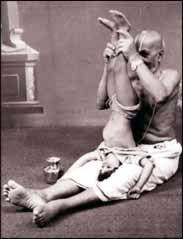Tirumalai Krishnamacharya
Tirumalai Krishnamacharya (November 18, 1888 – February 28, 1989) was an Indian yoga teacher, ayurvedic healer, and scholar. Often referred to as "The Father of Modern Yoga," Krishnamacharya is widely regarded as one of the most influential yoga teachers of the 20th century. His teachings and practices have significantly shaped the development of modern yoga, and many of his students went on to become prominent yoga teachers themselves.
Early Life[edit | edit source]
Tirumalai Krishnamacharya was born in the village of Muchukundapuram in the Chitradurga district of Karnataka, India. He was born into a family with a strong tradition of scholarship and devotion. His father, Tirumalai Srinivasa Tatacharya, was a well-known scholar of the Vedas and other sacred texts.
Education[edit | edit source]
Krishnamacharya's education began at an early age. He studied the Vedas, Upanishads, and other classical texts under the guidance of his father. He later traveled extensively across India to study with various teachers and scholars. He studied Sanskrit grammar, logic, and philosophy at the University of Mysore and later at the Banaras Hindu University.
Yoga Training[edit | edit source]
Krishnamacharya's formal training in yoga began when he traveled to the Himalayas to study with his guru, Sri Ramamohan Brahmachari. Under his guru's guidance, Krishnamacharya mastered the ancient practices of Hatha Yoga, Pranayama, and Asanas. He also learned the therapeutic applications of yoga, which he later integrated into his teachings.
Teaching Career[edit | edit source]
Krishnamacharya's teaching career began in the 1920s when he was invited to teach yoga at the Maharaja's College in Mysore. He later established a yoga school at the Jaganmohan Palace in Mysore, where he taught many students who would go on to become influential yoga teachers, including B.K.S. Iyengar, K. Pattabhi Jois, Indra Devi, and his own son, T.K.V. Desikachar.
Contributions to Yoga[edit | edit source]
Krishnamacharya is credited with reviving the practice of Hatha Yoga and integrating it with the principles of Ayurveda. He developed a system of yoga that emphasized the importance of adapting the practice to the individual needs of each student. This approach, known as Viniyoga, has had a lasting impact on modern yoga practices.
Legacy[edit | edit source]
Krishnamacharya's influence on modern yoga cannot be overstated. His teachings have been passed down through his students and continue to be practiced by millions of people around the world. His emphasis on the therapeutic benefits of yoga has also contributed to the growing field of Yoga Therapy.
Related Pages[edit | edit source]
- Yoga
- Hatha Yoga
- Pranayama
- Asanas
- Ayurveda
- B.K.S. Iyengar
- K. Pattabhi Jois
- Indra Devi
- T.K.V. Desikachar
- Viniyoga
- Yoga Therapy
Categories[edit | edit source]
Search WikiMD
Ad.Tired of being Overweight? Try W8MD's physician weight loss program.
Semaglutide (Ozempic / Wegovy and Tirzepatide (Mounjaro / Zepbound) available.
Advertise on WikiMD
|
WikiMD's Wellness Encyclopedia |
| Let Food Be Thy Medicine Medicine Thy Food - Hippocrates |
Translate this page: - East Asian
中文,
日本,
한국어,
South Asian
हिन्दी,
தமிழ்,
తెలుగు,
Urdu,
ಕನ್ನಡ,
Southeast Asian
Indonesian,
Vietnamese,
Thai,
မြန်မာဘာသာ,
বাংলা
European
español,
Deutsch,
français,
Greek,
português do Brasil,
polski,
română,
русский,
Nederlands,
norsk,
svenska,
suomi,
Italian
Middle Eastern & African
عربى,
Turkish,
Persian,
Hebrew,
Afrikaans,
isiZulu,
Kiswahili,
Other
Bulgarian,
Hungarian,
Czech,
Swedish,
മലയാളം,
मराठी,
ਪੰਜਾਬੀ,
ગુજરાતી,
Portuguese,
Ukrainian
Medical Disclaimer: WikiMD is not a substitute for professional medical advice. The information on WikiMD is provided as an information resource only, may be incorrect, outdated or misleading, and is not to be used or relied on for any diagnostic or treatment purposes. Please consult your health care provider before making any healthcare decisions or for guidance about a specific medical condition. WikiMD expressly disclaims responsibility, and shall have no liability, for any damages, loss, injury, or liability whatsoever suffered as a result of your reliance on the information contained in this site. By visiting this site you agree to the foregoing terms and conditions, which may from time to time be changed or supplemented by WikiMD. If you do not agree to the foregoing terms and conditions, you should not enter or use this site. See full disclaimer.
Credits:Most images are courtesy of Wikimedia commons, and templates, categories Wikipedia, licensed under CC BY SA or similar.
Contributors: Prab R. Tumpati, MD





